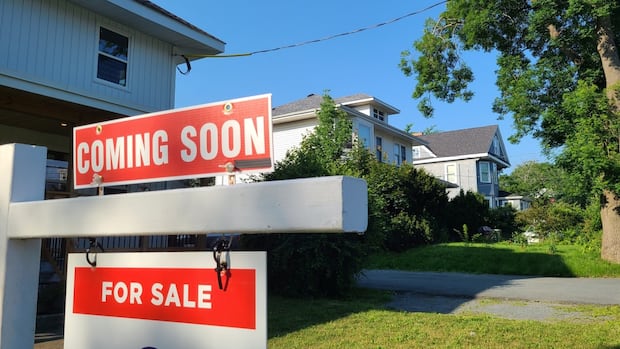Nova ScotiaHalifax is exploring the idea of raising the deed transfer tax to help with looming financial pressures, but any changes could only come with approval from the province.Councillor says tiered system might be a fair way of raising revenueHaley Ryan · CBC News · Posted: Sep 15, 2025 5:00 AM EDT | Last Updated: 2 hours agoHalifax staff will explore how the city’s current deed transfer tax rate compares to the rest of the country, and what the impacts might be of raising the rate. (Andrew Lam/CBC)Halifax is exploring the idea of raising the deed transfer tax to help with looming financial pressures, but any changes could only come with approval from the province.In recent months, councillors for the Halifax Regional Municipality have been discussing how to pay for infrastructure needed to support the rapidly growing capital city without placing a major burden on residents.The municipality has more than $2 billion in capital projects on the books over the next four years, including a new police station and redevelopment of the Halifax Forum. Last Tuesday, council passed Coun. Sam Austin’s motion asking staff to examine how Halifax could raise the deed transfer tax to help address those big-ticket items.”No one likes to pay more, but also no one likes to have your infrastructure falling apart, sitting in traffic, not having a transit system that can deliver, not having the recreation facilities,” Austin said in an interview.Coun. Sam Austin says it is important for Halifax to explore all avenues for raising revenue, to keep the city financially healthy. (David Laughlin/CBC)”At a certain point in politics, you have to have an honest conversation with people about if you want these things, they have to … be paid for somehow.”Financial staff also told council in July that inflation on construction costs remains high, and Halifax’s costs to pay down growing debt are expected to reach 10 per cent of total revenues within the next seven years.That threshold would push Halifax into the “moderate risk” category according to the province’s financial risk indicators. Over the past couple of decades, Halifax’s debt-servicing costs have hovered around a healthier three to four per cent, staff said.Halifax’s 1.5 per cent deed transfer tax applies to the purchase price of any property sold within the region. This annual revenue for the municipality has fluctuated in recent years, accounting for about $70 million in this 2025-26 fiscal year’s budget, and $65 million the previous year.But Austin also asked staff to explore a tiered system, used in places like British Columbia, Manitoba and Toronto, where cheaper properties would have a lower tax rate than higher-end homes.For example, British Columbia charges two per cent of the fair market value for properties between $200,000 and $2 million, and five per cent for those over $3 million.”If you’re buying, you know, a $2-million property, I think you can afford a higher tax rate than if you’re paying $400,000 for a pretty modest side of a duplex,” Austin said.”We can not only bring more money in to fix some of our growth challenges and capital challenges, but we could also do better by the folks in the municipality that it’s a burden on.”Neil Lovitt, vice-president of planning and economic intelligence at real estate consultant firm Turner Drake & Partners, said it makes sense for Halifax to explore all its revenue options — but the move is not a perfect solution.Using Halifax property transactions from 2024, Lovitt said applying Manitoba’s tiered system could result in an extra $8 million for HRM, while British Columbia’s would represent around $25 million to $30 million.”We’re talking about, not nothing, but also not much that’s going to really … go towards paying for $2 billion in capital projects,” Lovitt said last week.This rough calculation does not take into account whether a higher deed transfer tax would hurt property sales or development, which “would be the case to some degree,” Lovitt said.Neil Lovitt is vice-president of planning and economic intelligence at Turner, Drake & Partners Ltd. (Andrew Lam/CBC)It’s hard to say what the implications of a hypothetical increase would have on the real estate market without knowing the exact change, Lovitt said, and it could “vary quite a bit.”But in a similar example, Lovitt said his company has heard the province’s decision to hike the non-resident deed transfer tax from five per cent to 10 per cent this year has had a “significant impact on preventing sales from happening.”The province controls municipal deed transfer tax rates, which are set at a maximum of 1.5 per cent, so any Halifax changes would need to be approved by the PC government. Former CAO Cathie O’Toole said during the July meeting that Halifax also asked the province for clarity on whether the municipality can collect deed transfer taxes on properties that change hands through adjustments in corporate structure.”There are some existing collection opportunities we may not be fully capturing, essentially, under the current deed transfer tax,” said O’Toole.Halifax has taken that question to the Supreme Court of Nova Scotia, arguing that a developer owes the city the deed transfer tax on the transfer of “beneficial ownership” of Mic Mac Mall lands. That case is ongoing.ABOUT THE AUTHORHaley Ryan is the municipal affairs reporter for CBC covering mainland Nova Scotia. Got a story idea? Send an email to haley.ryan@cbc.ca, or reach out on Twitter @hkryan17.
Halifax explores raising deed transfer tax to help pay for major projects











